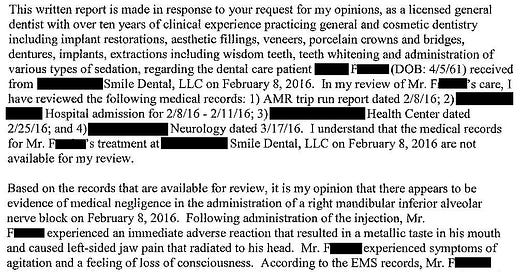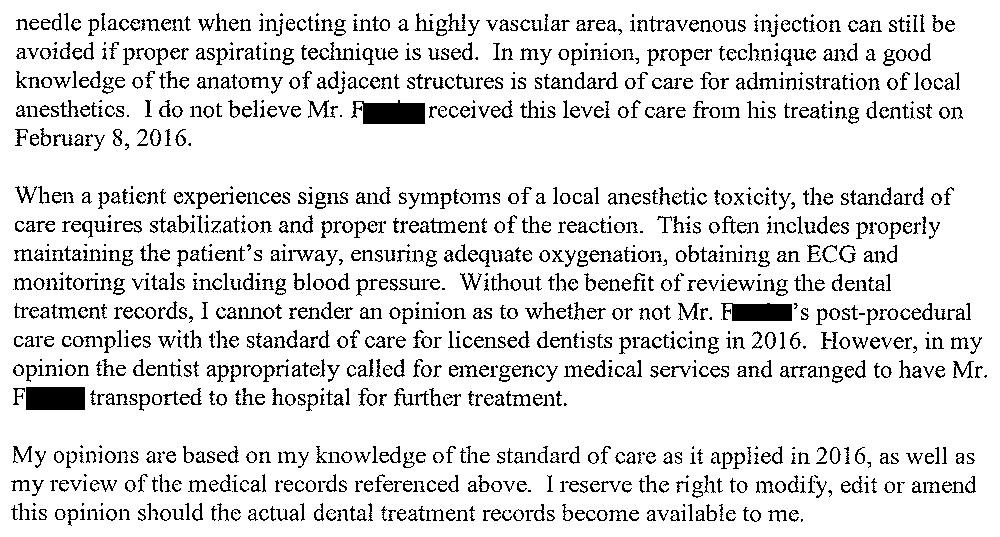A 54-year-old man presented to his dentist.
In preparation for dental work, the dentist performed a right mandibular inferior alveolar nerve block.
The patient had sudden onset of right-side jaw pain radiating to his temple, a metallic taste in his mouth, and began to lose consciousness.
He had a brief episode of convulsions afterward, then regained consciousness spontaneously.
The dentist called 911 and the patient was taken to the ED.
In the ED, his workup was relatively unremarkable.
He was admitted for 5 days due to concern for local anesthetic systemic toxicity.
The patient followed-up with a neurologist for lingering discomfort and neuropathy in his right jaw.
Become a better doctor.
New subscribers get 20% off during May.
A lawsuit was filed against the dentist.
The expert alleges that the injection may have accidentally been given intravascular.
The dental expert opinion is shown here:
Both sides agreed to a bench trial.
The judge found in favor of the plaintiff.
He entered judgment for $46,000 in economic damages and $350,000 in non-economic damages.
Improve your practice and expand your medicolegal expertise.
Paying subscribers get a new case every week and access to all the cases in the archive.
MedMalReviewer Analysis:
I usually ignore dental malpractice cases, but this one was particularly interesting to me because it involves one of the most common nerve blocks in the ED. The inferior alveolar nerve block is very easy to learn and provides immediate relief to the never-ending stream of patients coming to the ED all night for dental pain. As someone who once developed severe dental pain on vacation and begged a dentist for a block so I get a few hours of sleep, I have a deep appreciation for this nerve block.
It seems unlikely that this patient truly had LAST syndrome. The toxic dose of lidocaine is 4.5mg/kg. Assuming a 70kg patient and 1% lidocaine, this would require over 30mL of injected volume. It’s certainly possible to use this much lidocaine in a large laceration repair or other nerve block, but I’m dubious this patient had that much lidocaine injected into his mouth.
An intravascular injection could theoretically cause some localized symptoms, but it seems like they would be self-limited. There’s a possibility that the patient had a panic attack coupled with an episode of convulsive syncope. It’s hard to tell if his lingering symptoms are organic or psychogenic in nature, especially when there’s the possibility of secondary gain.
This article provides an excellent overview of inferior alveolar nerve block complications. I know most physicians do not get formal consent for this nerve block, and the complications are so rare that we don’t bother to consider them. It’s interesting that this paper mentions many of the same symptoms that the patient in this case experienced, including anxiety, syncope, and possibly direct trauma to the nerve.
The defense agreed to a bench trial, which was a mistake if the objective was to win. The defense is much more likely to win a jury trial than a bench trial. This is counterintuitive to many doctors, who may erroneously believe that an educated member of the professional class (the judge) is much more likely to dispassionately weigh the evidence than 12 lay people. If you want to win a trial, you should ask for a jury trial. That being said, the judge is less likely to issue a surprise nuclear verdict, and the expense and speed of a bench trial may offer some benefits over a jury trial.






The opinion of the plaintiff's expert seems sloppy. I've never heard of an ECG described as "asymptomatic." And the argument that the dentist was negligent seems to boil down to the syllogism "1. This reaction was caused by the local going intravascular, and 2. that doesn't happen with competent technique, so 3. the technique must have been incompetent." Pretty shaky.
Does anyone think 350 sounds a bit excessive? Is it from the tariffs? Lol.